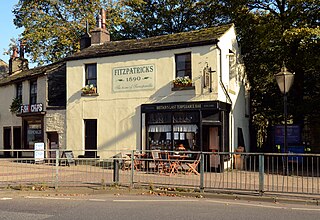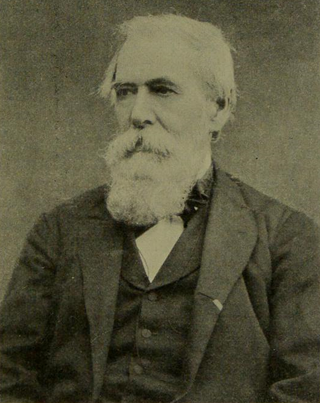
Prohibition is the act or practice of forbidding something by law; more particularly the term refers to the banning of the manufacture, storage, transportation, sale, possession, and consumption of alcoholic beverages. The word is also used to refer to a period of time during which such bans are enforced.

The temperance movement is a social movement promoting temperance or complete abstinence from consumption of alcoholic beverages. Participants in the movement typically criticize alcohol intoxication or promote teetotalism, and its leaders emphasize alcohol's negative effects on people's health, personalities and family lives. Typically the movement promotes alcohol education and it also demands the passage of new laws against the sale of alcohol, either regulations on the availability of alcohol, or the complete prohibition of it. During the 19th and early 20th centuries, the temperance movement became prominent in many countries, particularly in English-speaking, Scandinavian, and majority Protestant ones, and it eventually led to national prohibitions in Canada, Norway, Finland, and the United States, as well as provincial prohibition in India. A number of temperance organizations exist that promote temperance and teetotalism as a virtue.

The Maine Law, passed on June 2, 1851 in Maine, was the first statutory implementation of the developing temperance movement in the United States.

The Independent Order of Rechabites (IOR), also known as the Sons and Daughters of Rechab, is a fraternal organisation and friendly society founded in England in 1835 as part of the wider temperance movement to promote total abstinence from alcoholic beverages. Always well connected in upper society and involved in financial matters, it gradually transformed into a financial institution which still exists, and still promotes abstinence. The Order has been active in Australia from 1843, promoting temperance and as a benefit society. A branch was established in the United States in 1842, and also flourished for a time. In the United Kingdom, the Order trades under the name of Healthy Investment.

Hope UK is a United Kingdom Christian charity based in London, England which educates children and young people about drug and alcohol abuse. Local meetings started in 1847 and a formal organisation was established in 1855 with the name The United Kingdom Band of Hope Union.

Sir Wilfrid Lawson, 2nd Baronet was an English temperance campaigner and radical, anti-imperialist Liberal Party politician who sat in the House of Commons variously between 1859 and 1906. He was recognised as the leading humourist in the House of Commons.

Eliza Daniel Stewart was an American early temperance movement leader. She sometimes referred to herself as "Mother Stewart".

A temperance bar, also known as an alcohol-free bar, sober bar, or dry bar, is a type of bar that does not serve alcoholic beverages. An alcohol-free bar can be a business establishment or located in a non-business environment or event, such as at a wedding. Alcohol-free bars typically serve non-alcoholic beverages, such as non-alcoholic cocktails known as mocktails, alcohol-free beer or low-alcohol beer, alcohol-free wine, juice, soft drinks and water. Popular temperance drinks include cream soda, dandelion and burdock, sarsaparilla, and Vimto, among others. Various foods may also be served.

Prohibition in Canada was a ban on alcoholic beverages that arose in various stages, from local municipal bans in the late 19th century, to provincial bans in the early 20th century, and national prohibition from 1918 to 1920. The relatively large and powerful beer and alcohol manufacturing sector, and the huge working class that purchased their products, failed to convince any of the governments to reverse their stance on prohibition. Most provinces repealed their bans in the 1920s, though alcohol was illegal in Prince Edward Island from 1901 to 1948. By comparison, Ontario's temperance act was in effect from 1916 to 1927.
Events from the year 1853 in the United Kingdom.
Dawson Burns (1828–1909) was an English Baptist minister and temperance activist.

The temperance movement in New Zealand originated as a social movement in the late-19th century. In general, the temperance movement aims at curbing the consumption of alcohol. Although it met with local success, it narrowly failed to impose national prohibition on a number of occasions in the early-20th century. Temperance organisations remain active in New Zealand today.
The temperance movement in the United Kingdom was a social movement that campaigned against the recreational use and sale of alcohol, and promoted total abstinence (teetotalism). In the 19th century, high levels of alcohol consumption and drunkenness were seen by social reformers as a danger to society's wellbeing, leading to social issues such as poverty, child neglect, immorality and economic decline. Temperance societies began to be formed in the 1830s to campaign against alcohol. Specific groups were created over periods of time dedicated to the different aspects of drinking. For example, in 1847, the Band of Hope was created to persuade children not to start drinking alcohol. Most of these temperance groups were aimed at the working class. Temperance was also supported by some religious groups, particularly the Nonconformist Churches. Although the temperance movement met with local success in parts of Britain, it failed to impose national prohibition, and disappeared as a significant force following the Second World War.

The Dominion Alliance for the Total Suppression of the Liquor Traffic was an organization established in 1877 in Canada that lobbied for prohibition of alcohol. Membership was largely Protestant and Anglophone. The Dominion Alliance faced passive resistance from politicians concerned about the views of their constituents, particularly in Quebec, but had some success at the local level. Sale of alcohol was prohibited provincially and then nationally during World War I (1914–18). After the war the national and provincial temperance laws were repealed and the Dominion Alliance faded into irrelevance.

Norman Shanks Kerr was a Scottish physician and social reformer who is remembered for his work in the British temperance movement. He originated the Total Abstinence Society and was founder and first president of the Society for the Study and Cure of Inebriety which was founded in 1884.

Frederic Richard Lees was an English temperance advocate and vegetarian.

Thomas Holliday Barker was an English temperance and vegetarianism advocate.

Women's Christian Temperance Union of New Zealand is a non-partisan, non-denominational, and non-profit organization that is the oldest continuously active national organisation of women in New Zealand. The national organization began in 1885 during the visit to New Zealand by Mary Clement Leavitt, the first world missionary for the Woman's Christian Temperance Union. The WCTU NZ was an early branch of the World Woman's Christian Temperance Union and a founding affiliate of the National Council of Women of New Zealand. Men may join the WCTU NZ as honorary members.
Non-Partisan National Women's Christian Temperance Union was an American temperance association organized at Cleveland, Ohio, January 22, 1890, as a protest against the attitude of the Woman's Christian Temperance Union (W.C.T.U.) toward political parties.














